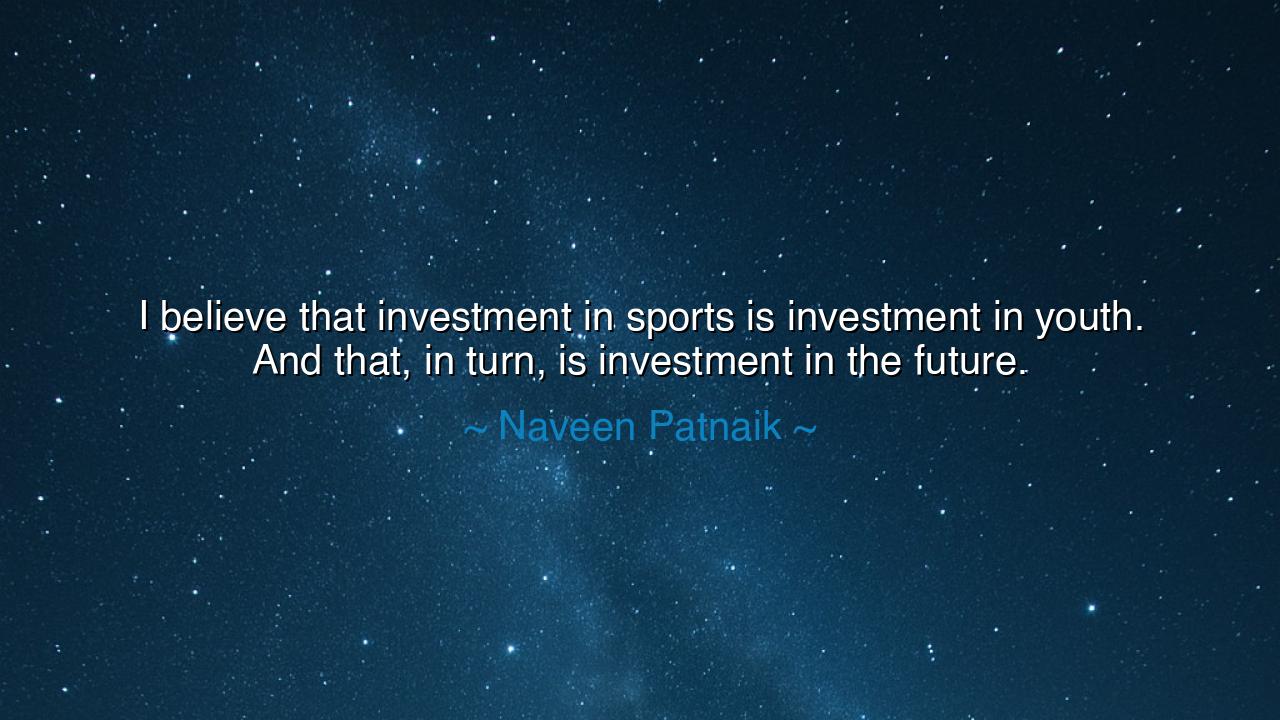
I believe that investment in sports is investment in youth. And
I believe that investment in sports is investment in youth. And that, in turn, is investment in the future.






Naveen Patnaik’s words, “I believe that investment in sports is investment in youth. And that, in turn, is investment in the future,” are not just a reflection on the value of athletics, but a profound truth about the potential of youth and the role of sports in shaping a nation’s future. To understand this, one must look beyond the field, the stadium, or the game. For Patnaik’s statement is an echo of the ancient wisdom that investing in youth is the foundation of building a society that is strong, resilient, and full of promise. Sports, in this context, are not mere games; they are the training grounds for the leaders, innovators, and citizens of tomorrow.
In the ancient world, youth was seen as the seed of the future, and the education of young people was paramount to the survival and prosperity of any civilization. The Greeks, for example, placed great emphasis on the development of the body and mind. Their physical training in the form of athletics was not simply for sport, but to prepare the youth for the challenges of life, to imbue them with strength, discipline, and unity. The Olympic Games, which began in ancient Greece, were a celebration of human potential, a way to honor the body’s capacity for excellence, and to foster cooperation among the Greek city-states. In this light, Patnaik’s words resonate with a timeless truth: investing in youth through sports is not just an investment in their physical abilities, but in their future contributions to the greater good of society.
Consider the story of Sparta, the ancient city-state renowned for its rigorous training of youth in military arts. From a young age, Spartan children were trained in strength, endurance, and teamwork—qualities that were deemed essential not only for individual success but for the prosperity and defense of the entire city-state. The Spartan commitment to shaping the next generation of leaders through physical discipline and education has long been regarded as a cornerstone of their success. Just as Sparta relied on its youth to secure its place in history, so too does Patnaik believe that the strength of a nation lies in how it invests in the youth of today, preparing them to lead tomorrow.
Patnaik’s belief also speaks to the moral and spiritual benefits of sports. Throughout history, games and competitions have been a way of forging not just physical strength, but character. In the same way that the ancients believed in the importance of developing virtues like courage, perseverance, and teamwork, so too do modern sports provide a platform for young people to learn these essential qualities. The lessons taught on the playing field—resilience in the face of adversity, humility in victory, and grace in defeat—are the very virtues that shape young people into responsible leaders and citizens.
Consider the story of Jesse Owens, the American track and field athlete whose performance at the 1936 Berlin Olympics defied Adolf Hitler’s ideals of Aryan supremacy. Owens, a young African American man, stood tall in the face of racial prejudice and political pressure, winning four gold medals and becoming a symbol of the strength of the human spirit. His success was not just the result of his physical abilities, but of the lessons he learned through years of hard work, sacrifice, and dedication to his sport. In this way, sports helped Owens shape his character, as they have done for countless athletes throughout history. Sports are not just about winning medals—they are about forming individuals who will go on to change the world, just as Owens did with his courage and integrity.
Patnaik’s statement speaks to the future—a future that is shaped by the decisions we make today. Investing in sports is an investment in the next generation’s ability to lead, to create, and to serve. It is through the lessons learned on the playing field that youth gain the skills and mindsets that will enable them to navigate the challenges of life and contribute meaningfully to society. Just as the ancients understood the importance of preparing the youth to face the future, so too must we recognize that the future is shaped by the opportunities we provide to the next generation—whether through education, sports, or any other means.
Lesson for the ages:
True progress and success in any society lie in how it invests in its youth. Sports are not just games; they are the crucibles in which the character, strength, and leadership of tomorrow are forged. By providing young people with the opportunity to participate in sports, we are giving them the tools they need to thrive in the future. This investment is not just in physical prowess, but in the development of the virtues that sustain society—discipline, teamwork, perseverance, and integrity.
Practical Action:
As you move forward in your own life, whether as a parent, teacher, or leader, remember that the investment in youth is the greatest investment you can make. Encourage young people to engage in sports, to learn the lessons they offer, and to develop the qualities that will make them not just successful athletes, but successful individuals. By investing in sports, you are helping to shape a stronger, more resilient future for all. Just as the ancients valued the cultivation of youth for the good of society, so too must we invest in the next generation, for they are the builders of tomorrow.






AAdministratorAdministrator
Welcome, honored guests. Please leave a comment, we will respond soon